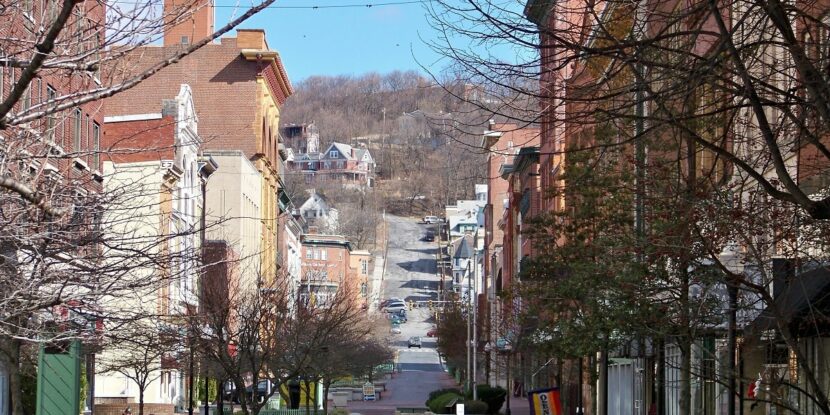Imagine if the government sent you a letter saying, “We intend to take your house, demolish it, and build a chain restaurant.”
In rural western Maryland, there’s a memorable little town called Cumberland. Nestled in the Appalachian Mountains, the town was a gateway to the west in early American history and was once Maryland’s second largest city. It’s now quite literally split in half by Interstate 68, which runs right through downtown on a large bridge. Anyone who’s taken I-68 will remember passing through and watching the speed limit drop from 70 to 40.
Driving through Cumberland last week, I saw a banner from the bridge that said “Still Not For Sale – SaveRollingMill.com.” I was curious, so I looked it up and learned that a feisty group of Cumberland residents are resisting an eminent domain land grab by the local government.
The city council and a developer are seeking to bulldoze a neighborhood and build a new chain restaurant. Sounds great in theory, especially because, due to economic decline, Cumberland is one of the poorest towns in America, with a per capital income of just over $15,000. They could use the new jobs. But there’s just one problem — people still live on the site, and they don’t want to move. Nevertheless, the city wants to use the force of government to evict them.
The Fifth Amendment says, “nor shall private property be taken for public use, without just compensation.” It’s called eminent domain, and it’s used legitimately to help construct roads, military bases, utilities, etc. The Constitution’s Framers, however, never intended it to be used for the forcible taking of people’s property to give to a business, despite the Supreme Court’s infamous decision in Kelo v. City of New London.
In Cumberland, the city council and its developer, operating under the name Cumberland Economic Development Corporation (CEDC), have been planning for a couple of years to bulldoze and redevelop the Rolling Mill neighborhood, and they’ve bought out 80 percent of the homes there. But a dozen homeowners there don’t want to move. One couple in their 80s, married for 62 years, is afraid that they would be pushed into a nursing home. Another resident lives in a home that was built for her great-great aunt in 1897.
The CEDC makes the case that Rolling Mill is a high-crime neighborhood, and rebuilding with new businesses will revitalize downtown Cumberland. They have a good case to make, and I sympathize — I’m glad there are people working across America to revitalize small towns. But the interests of the Democrat-dominated local government and the developer cannot be allowed to trump the property rights of residents. The Save Rolling Mill group has even proposed alternative development plans that wouldn’t require abusing eminent domain.
The dispute in Cumberland has dragged on for a couple years now, and the city and the developer are still trying to negotiate with the homeowners. But rather than threaten these homeowners with the force of law, the CEDC should simply increase its offer to buy the land until they convince the owners to sell. And if the owners still don’t want to sell, the city and the developer should find another site. That’s how it works in a free market. The city and the developer must stop engaging in crony capitalism. The government has no right to seize private property and give it to a private corporation for the purpose of making money.
Good for the people of Rolling Mill. They should continue their fight against government’s abuse of eminent domain.
Photo credit: Jon Dawson via Flickr, CC BY-ND 2.0


